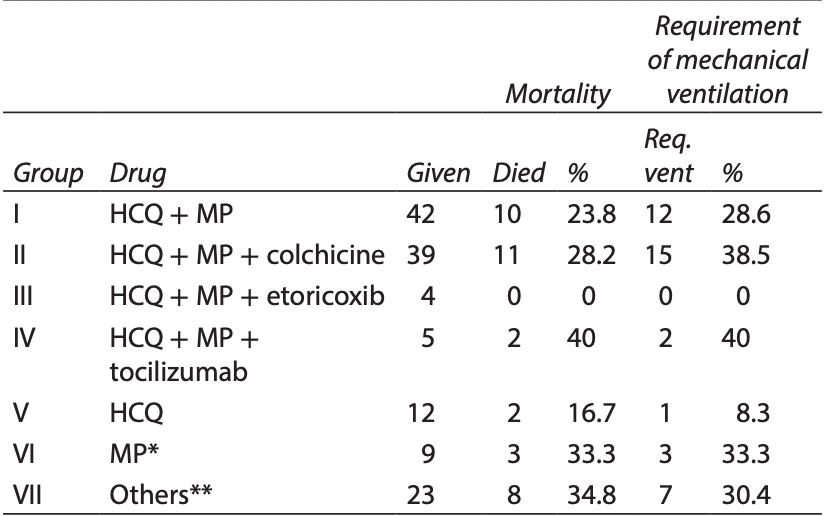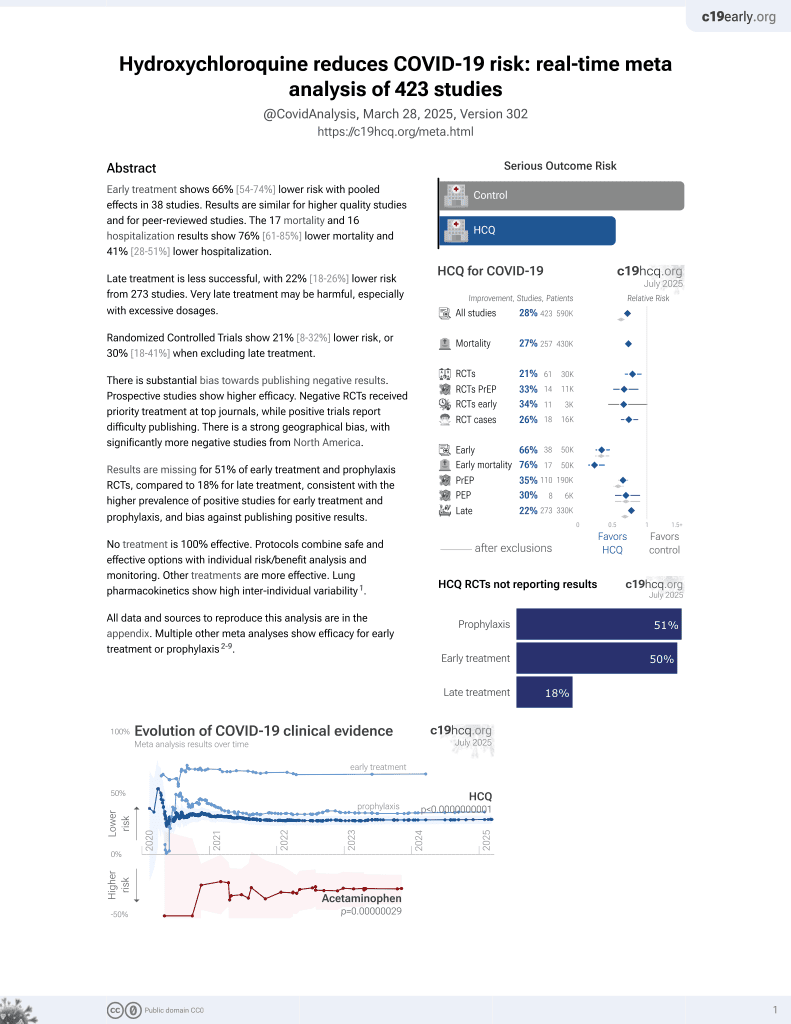
A Retrospective Observational Study of Hypoxic COVID-19 Patients Treated with Immunomodulatory Drugs in a Tertiary Care Hospital
et al., Indian Journal of Critical Care Medicine, doi:10.5005/jp-journals-10071-23599, Dec 2020
HCQ for COVID-19
1st treatment shown to reduce risk in
March 2020, now with p < 0.00000000001 from 424 studies, used in 59 countries.
No treatment is 100% effective. Protocols
combine treatments.
6,400+ studies for
210+ treatments. c19early.org
|
Retrospective 134 hospitalized COVID-19 patients in India, showing no significant difference with HCQ treatment in unadjusted results.
Although the 29% lower mortality is not statistically significant, it is consistent with the significant 27% lower mortality [22‑31%] from meta-analysis of the 256 mortality results to date.
This study is excluded in the after exclusion results of meta-analysis:
unadjusted results with no group details.
Study covers colchicine and HCQ.
|
risk of death, 28.7% lower, RR 0.71, p = 0.36, treatment 25 of 102 (24.5%), control 11 of 32 (34.4%), NNT 10.
|
| Effect extraction follows pre-specified rules prioritizing more serious outcomes. Submit updates |
Mahale et al., 31 Dec 2020, retrospective, India, peer-reviewed, 22 authors, study period 22 March, 2020 - 21 May, 2020.
A Retrospective Observational Study of Hypoxic COVID-19 Patients Treated with Immunomodulatory Drugs in a Tertiary Care Hospital
Indian Journal of Critical Care Medicine, doi:10.5005/jp-journals-10071-23599
Objectives: To describe the demographics and evaluate the clinical outcomes of hypoxic coronavirus disease-2019 (COVID-19) patients treated with different immunomodulatory (IM) drugs in a resource-limited setting.
Materials and methods: We conducted a retrospective cohort study of these patients admitted to our hospital between March 22 and May 31, 2020. Data were abstracted from multiple electronic data sources or patient charts to provide information on patient characteristics, clinical, laboratory variables, and outcomes. Results: A total of 134 patients met the inclusion criteria and were followed up till June 7, 2020. The median age of the patients was 55.6 years (range 20-89 years) and 68% were men. At least one comorbidity was seen in 72% of the patients with diabetes (44%) and hypertension (46%) being the most common. At triage, fever (82%), shortness of breath (77%), and cough (61%) were the most common presenting symptoms. A PaO 2 /FiO 2 ratio less than 300 was seen in 60%, and 4.5% required invasive mechanical ventilation within 72 hours of hospital admission. Five immunomodulatory agents (hydroxychloroquine, methylprednisolone, colchicine, etoricoxib, and tocilizumab) were administered in different combinations. Overall, in-hospital mortality was 26.9%, and 32% required mechanical ventilation. Around 69% of patients were discharged home. Five variables (SpO 2 , PaO 2 /FiO 2 ratio, leukocytosis, lymphopenia, and creatinine) on admission were found to be significant in the patients who died.
Conclusion: Our study provides the characteristics and outcomes of hypoxic COVID-19 patients treated with IM drugs in varied combination. Five independent variables were strong predictors of mortality.
References
Alijotas-Reig, Esteve-Valverde, Belizna, Immunomodulatory therapy for the management of severe COVID-19. Beyond the anti-viral therapy: a comprehensive review, Autoimmun Rev, doi:10.1016/j.autrev.2020.102569
Andrews, Areekal, Rajesh, Krishnan, Suryakala et al., First confirmed case of COVID-19 infection in India: a case report, Indian J Med Res, doi:10.4103/ijmr.IJMR_2131_20
Borba, Val, Sampaio, Alexandre, Melo et al., Effect of high vs low doses of chloroquine diphosphate as adjunctive therapy for patients hospitalized with severe acute respiratory syndrome coronavirus 2 (SARS-CoV-2) infection, JAMA Network Open, doi:10.1001/jamanetworkopen.2020.8857
Chorin, Dai, Shulman, Wadhwani, Bar-Cohen et al., The QT interval in patients with COVID-19 treated with hydroxychloroquine and azithromycin, Nat Med, doi:10.1038/s41591-020-0888-2
Cruz, Ruiz-Antorán, Gómez, López, Sánchez et al., Impact of glucocorticoid treatment in SARS-CoV-2 infection mortality: a retrospective controlled cohort study, Antimicrob Agents Chemother, doi:10.1128/aac.01168-20
Deftereos, Giannopoulos, Vrachatis, Siasos, Giotaki et al., Effect of colchicine vs standard care on cardiac and inflammatory biomarkers and clinical outcomes in patients hospitalized with coronavirus disease 2019, JAMA Network Open, doi:10.1001/jamanetworkopen.2020.13136
Fadel, Morrison, Vahia, Smith, Chaudhry et al., Henry Ford COVID-19 Management Task Force
Felsenstein, Herbert, Mcnamara, Hedrich, COVID-19: immunology and treatment options, Clin Immunol, doi:10.1016/j.clim.2020.108448
Gong, Ou, Qiu, Jie, Chen et al., A tool for early prediction of severe coronavirus disease 2019 (COVID-19): a multicenter study using the risk nomogram in Wuhan and Guangdong, China Clin Infect Dis, doi:10.1093/cid/ciaa443
Grasselli, Zangrillo, Zanella, Antonelli, Cabrini et al., Baseline characteristics and outcomes of 1591 patients infected with SARS-CoV-2 admitted to ICUs of the Lombardy region, Italy, JAMA, doi:10.1001/jama.2020.5394
Guaraldi, Meschiari, Cozzi-Lepri, Milic, Tonelli et al., Tocilizumab in patients with severe COVID-19: a retrospective cohort study. The lancet, Rheumatology, doi:10.1016/S2665-9913(20)30173-9
Huang, Pranata, Lymphopenia in severe coronavirus disease-2019 (COVID-19): systematic review and meta-analysis, J Intensive Care, doi:10.1186/s40560-020-00453-4
Huang, Wang, Li, Ren, Zhao et al., Clinical features of patients infected with 2019 novel coronavirus in Wuhan, China, Lancet, doi:10.1016/S0140-6736(20)30183-5
Kewan, Covut, Mj, Rose, Gopalakrishna et al., Tocilizumab for treatment of patients with severe COVID-19: a retrospective cohort study, E Clin Med, doi:10.1016/j.eclinm.2020.100418
Klopfenstein, Zayet, Lohse, Balblanc, Badie et al., Tocilizumab therapy reduced intensive care unit admissions and/or mortality in COVID-19 patients, Médecine et Maladies Infectieuses, doi:10.1016/j.medmal.2020.05.001
Li, Xu, Yu, Wang, Tao et al., Risk factors for severity and mortality in adult COVID-19 inpatients in Wuhan, J Aller Clin Immunol, doi:10.1016/j.jaci.2020.04.006
Mohfw, Gov, None
Ranieri, Rubenfeld, Thompson, Ferguson, Caldwell, Acute respiratory distress syndrome: the Berlin definition, JAMA, doi:10.1001/jama.2012.5669
Richardson, Hirsch, Narasimhan, Crawford, Mcginn et al., Presenting characteristics, comorbidities, and outcomes among 5700 patients hospitalized with COVID-19 in the New York city area, JAMA, doi:10.1001/jama.2020.6775
Ruan, Yang, Wang, Jiang, Song, Clinical predictors of mortality due to COVID-19 based on an analysis of data of 150 patients from Wuhan, China, Intensive Care Med, doi:10.1007/s00134-020-05991-x
Salvi, Patankar, Emerging pharmacotherapies for COVID-19, Biomed Pharmacother, doi:10.1016/j.biopha.2020.110267
Sander, Neill, Pohl, Prostaglandin E2 as a modulator of viral infections, Front Physiol, doi:10.3389/fphys.2017.00089
Siddiqi, Mehra, COVID-19 illness in native and immunosuppressed states: a clinical-therapeutic staging proposal, J Heart Lung Transplantat, doi:10.1016/j.healun.2020.03.012
Tufan, Güler, Matucci-Cerinic, COVID-19, immune system response, hyperinflammation and repurposing antirheumatic drugs, Turk J Med Sci, doi:10.3906/sag-2004-168
Vetter, Clues or miscues?, Circulation, doi:10.1161/CIRCULATIONAHA.107.700195
Wang, He, Yu, Hu, Bao et al., Coronavirus disease 2019 in elderly patients: characteristics and prognostic factors based on 4-week follow-up, J Infect, doi:10.1016/j.jinf.2020.03.01
Wu, Chen, Cai, Xia, Zhou et al., Risk factors associated with acute respiratory distress syndrome and death in patients with coronavirus disease 2019 pneumonia in Wuhan, China, JAMA Int Med, doi:10.1001/jamainternmed.2020.0994
Yang, Liu, Tao, Li, The diagnostic and predictive role of NLR, d-NLR and PLR in COVID-19 patients, Int Immunopharmacol, doi:10.1016/j.intimp.2020.106504
Yang, Yu, Xu, Shu, Xia et al., Clinical course and outcomes of critically ill patients with SARS-CoV-2 pneumonia in Wuhan, China: a single-centered, retrospective, observational study, Lancet Respirat Med, doi:10.1016/S2213-2600(20)30079-5
Zhang, Qin, Li, Wang, Zhao et al., A novel scoring system for prediction of disease severity in COVID-19, Front Cell Infect Microbiol, doi:10.3389/fcimb.2020.00318
Zhou, Yu, Du, Fan, Liu et al., Clinical course and risk factors for mortality of adult inpatients with COVID-19 in Wuhan, China: a retrospective cohort study, Lancet, doi:10.1016/S0140-6736(20)30566-3
DOI record:
{
"DOI": "10.5005/jp-journals-10071-23599",
"ISSN": [
"0972-5229",
"1998-359X"
],
"URL": "http://dx.doi.org/10.5005/jp-journals-10071-23599",
"alternative-id": [
"10.5005/jp-journals-10071-23599"
],
"author": [
{
"affiliation": [],
"family": "Purandare",
"given": "Bharat",
"sequence": "first"
},
{
"affiliation": [],
"family": "Rajhans",
"given": "Prasad",
"sequence": "additional"
},
{
"affiliation": [],
"family": "Jog",
"given": "Sameer",
"sequence": "additional"
},
{
"affiliation": [],
"family": "Dalvi",
"given": "Pradip",
"sequence": "additional"
},
{
"affiliation": [],
"family": "Prayag",
"given": "Parikshit",
"sequence": "additional"
},
{
"affiliation": [],
"family": "Marudwar",
"given": "Prasanna",
"sequence": "additional"
},
{
"affiliation": [],
"family": "Pawar",
"given": "Harshwardhan S",
"sequence": "additional"
},
{
"affiliation": [],
"family": "Pawar",
"given": "Balasaheb",
"sequence": "additional"
},
{
"affiliation": [],
"family": "Mahale",
"given": "Nilesh",
"sequence": "additional"
},
{
"affiliation": [],
"family": "Narasimhan",
"given": "Vikram L",
"sequence": "additional"
},
{
"affiliation": [],
"family": "Oak",
"given": "Gauri",
"sequence": "additional"
},
{
"affiliation": [],
"family": "Marreddy",
"given": "Srinath",
"sequence": "additional"
},
{
"affiliation": [],
"family": "Bedekar",
"given": "Amruta",
"sequence": "additional"
},
{
"affiliation": [],
"family": "Akole",
"given": "Prasad",
"sequence": "additional"
},
{
"affiliation": [],
"family": "Bhurke",
"given": "Bhagyashri",
"sequence": "additional"
},
{
"affiliation": [],
"family": "Chavan",
"given": "Shailaja",
"sequence": "additional"
},
{
"affiliation": [],
"family": "Telbhare",
"given": "Vishnu",
"sequence": "additional"
},
{
"affiliation": [],
"family": "Diwane",
"given": "Dnyaneshwar",
"sequence": "additional"
},
{
"affiliation": [],
"family": "Shahane",
"given": "Manasi",
"sequence": "additional"
},
{
"affiliation": [],
"family": "Prayag",
"given": "Amrita",
"sequence": "additional"
},
{
"affiliation": [],
"family": "Gugale",
"given": "Shradha",
"sequence": "additional"
},
{
"affiliation": [],
"family": "Bhor",
"given": "Shreyas",
"sequence": "additional"
}
],
"container-title": [
"Indian Journal of Critical Care Medicine"
],
"content-domain": {
"crossmark-restriction": false,
"domain": []
},
"created": {
"date-parts": [
[
2020,
12,
2
]
],
"date-time": "2020-12-02T05:02:03Z",
"timestamp": 1606885323000
},
"deposited": {
"date-parts": [
[
2021,
5,
28
]
],
"date-time": "2021-05-28T02:35:44Z",
"timestamp": 1622169344000
},
"indexed": {
"date-parts": [
[
2022,
2,
3
]
],
"date-time": "2022-02-03T03:26:26Z",
"timestamp": 1643858786360
},
"is-referenced-by-count": 12,
"issn-type": [
{
"type": "print",
"value": "0972-5229"
},
{
"type": "electronic",
"value": "1998-359X"
}
],
"issue": "11",
"issued": {
"date-parts": [
[
2020
]
]
},
"journal-issue": {
"issue": "11",
"published-online": {
"date-parts": [
[
2020
]
]
}
},
"language": "en",
"link": [
{
"URL": "https://www.ijccm.org/doi/pdf/10.5005/jp-journals-10071-23599",
"content-type": "unspecified",
"content-version": "vor",
"intended-application": "similarity-checking"
}
],
"member": "2914",
"original-title": [],
"page": "1020-1027",
"prefix": "10.5005",
"published": {
"date-parts": [
[
2020
]
]
},
"published-online": {
"date-parts": [
[
2020
]
]
},
"published-print": {
"date-parts": [
[
2020,
12,
16
]
]
},
"publisher": "Jaypee Brothers Medical Publishing",
"reference-count": 0,
"references-count": 0,
"relation": {},
"score": 1,
"short-container-title": [],
"short-title": [],
"source": "Crossref",
"subject": [
"Critical Care and Intensive Care Medicine"
],
"subtitle": [],
"title": [
"A Retrospective Observational Study of Hypoxic COVID-19 Patients Treated with Immunomodulatory Drugs in a Tertiary Care Hospital"
],
"type": "journal-article",
"volume": "24"
}
mahale
